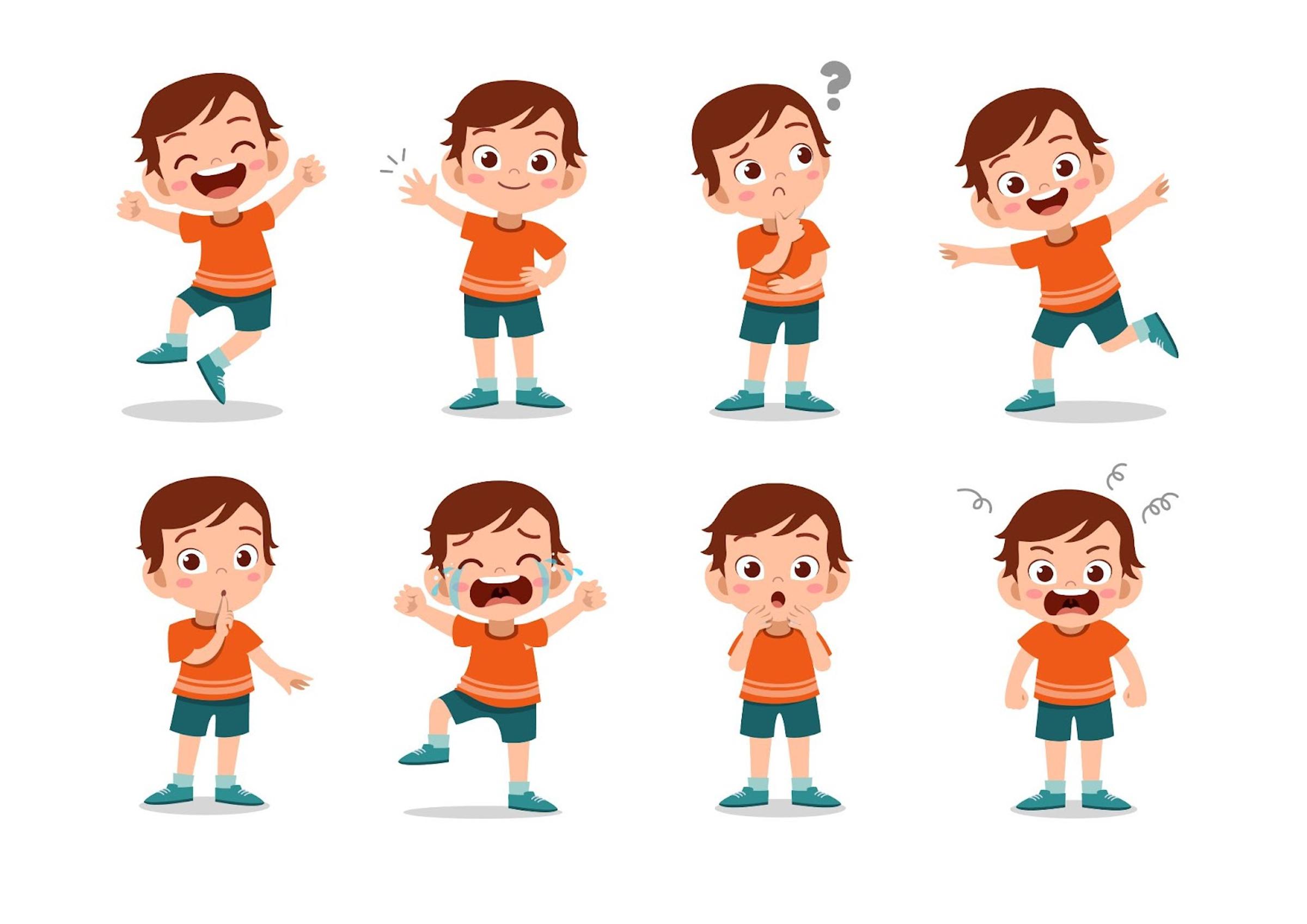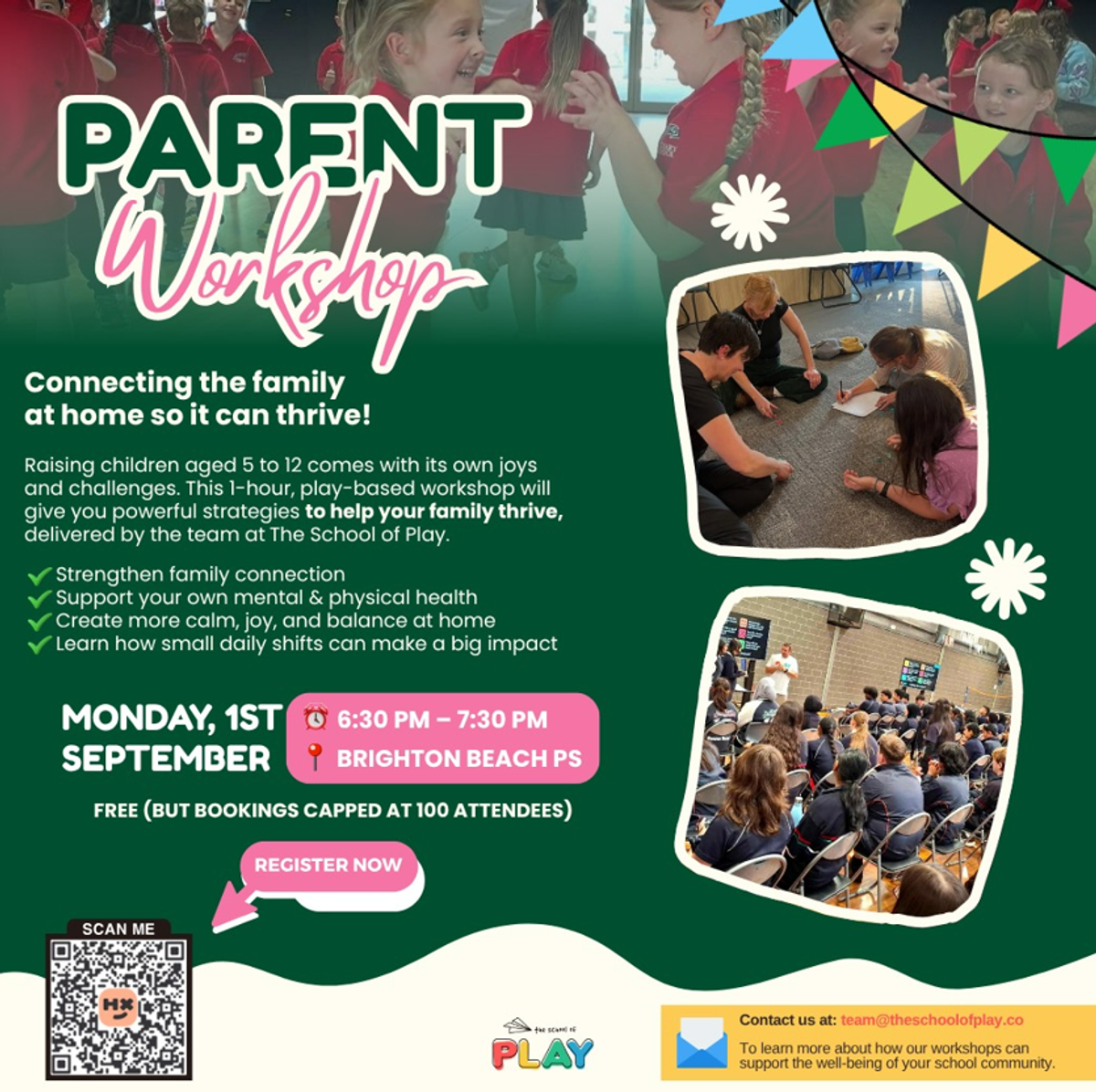Wellbeing

https://brightonbeachps.vic.schooltv.me - USE THIS LINK TO CHECK OUT SchoolTV
If you haven't already, jump on for some fantastic resources to support you, as parents, to navigate the many complex issues young people face.
We really encourage you to jump on and see what's there - as of September we'll be tailoring the topics based on the metric data collected so that we can tailor our BBPS specific site to the needs of our community.
PARENT SESSION - if the information in previous comms hasn't been enough, see below for greater detail about the School of Play session, planned for parents - to support our children, but also to support ourselves and our own mental health.
This dynamic session (the energy of the two presenters is sensational) unpacks the following:
1. Strengthening Family Bonds
How it Helps: Parents will learn and experience simple, fun activities designed to be done together as a family without screens. These shared moments foster trust, laughter, and open communication.
Outcome: Families leave with ready-to-use games and rituals that strengthen relationships, making quality time together a regular and joyful habit.
2. Supporting Children’s Emotional Regulation
How it Helps: We'll show you a range of play-based activities that give children safe, physical, and creative outlets to express and manage big emotions.
Outcome: Parents feel confident using play to help their children calm down, refocus, and build resilience when faced with challenges.
3. Building Physical Health & Energy
How it Helps: Parents will take part in active games that are simple to set up at home, requiring little space or equipment, encouraging daily movement for the whole family.
Outcome: Families leave with fun “movement boosters” that promote physical fitness, coordination, and energy, all while having a laugh.
4. Boosting Mental Well-Being
How it Helps: Activities will be designed to reduce stress, spark joy, and create opportunities for positive reflection and gratitude.
Outcome: Parents can introduce small daily play moments that lift mood, improve outlook, and create a calmer, happier household environment.
5. Creating Device-Free Connection
How it Helps: Parents will see firsthand how engaging, hands-on play can be a natural replacement for screen time without feeling like a “restriction.”
Outcome: Families gain strategies to reduce reliance on devices while building healthier, more meaningful connections through real-world interaction.
6. Increasing Parental Confidence & Creativity
How it Helps: Parents will practise adapting play activities to different ages, moods, and spaces, making it easier to keep play fresh and relevant.
Outcome: Parents leave feeling empowered, with a toolkit of games, prompts, and variations that they can confidently lead at home.
THERE ARE LIMITED SPOTS, this session has now been opened to our Upstander Network schools so spaces will fill quickly. Booking essential!
Our FUNctioning Skills - our final week - a big thanks to Miss Wendy's expertise and passion in this area.
- Sustained attention staying focused and feeling more successful
- Working memory – a focus on helping our children retain information
- Organisation – of things and thinking
- Inhibition – helping our children to stop and think before they act
- Self-monitoring - tuning in and making adjustments
FUNctioning Skill #6: Emotional Control
What we’re focusing on: Emotional Control
Emotional control doesn’t mean never feeling big feelings.
It means being able to ride the waves — to stay afloat through frustration, disappointment, excitement, or sadness without capsizing completely.
It’s not about shutting feelings down. It’s about learning to carry them.
Why it matters:
When children can stay connected to their thinking brain even during big emotions, they can problem-solve, communicate, and bounce back faster.
Emotional control builds strong relationships, better learning, and deeper self-trust.
Signs your child might be building this skill — or could use more support:
- Big reactions to small frustrations
- Difficulty calming down after getting upset
- Quick swings between emotions
- Meltdowns when plans change unexpectedly
- Struggling to “stay in the game” when things don’t go their way
Once again, normal and developmentally expected.
Emotional control strengthens with time, connection, and gentle support.
How you can help at home, warmly and patiently:
- Name feelings without judgment: “You’re feeling really disappointed right now.”
- Model calming strategies: Breathing together, taking a movement break, or using humour.
- Practise flexible thinking: “Plans changed — what’s our plan B?”
- Create safe spaces for big feelings: “It’s okay to be upset. I’m here.”
- Celebrate recoveries, not just calm moments: “You were so frustrated — and you found your way back.”
Chores that build emotional control:
- Sticking with a job they don’t like (with calm support)
- Handling disappointment if a chore isn’t perfect
- Re-doing something when asked-without meltdown
- Helping with a shared family task (e.g. group clean up)
- Waiting patiently while someone else finishes their part
- Helping out when tired or grumpy (within reason)
- Choosing between two chores and sticking with the choice
Games and activities that build emotional control:
• Yoga or mindfulness games
• Freeze Dance (starting and stopping feelings through music!)
• Storytelling about “times I stayed calm”
• Emotion charades (“Act out excited, then calm!”)
• Role-playing games with shifting storylines
Final note:
Emotional control isn’t about suppressing feelings. It’s about helping children carry them — with courage, flexibility, and growing wisdom.
You are your child’s safe harbour in every storm.
Together, we’re raising children who can feel deeply — and still move forward.

